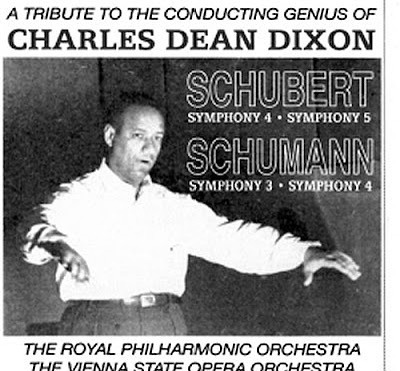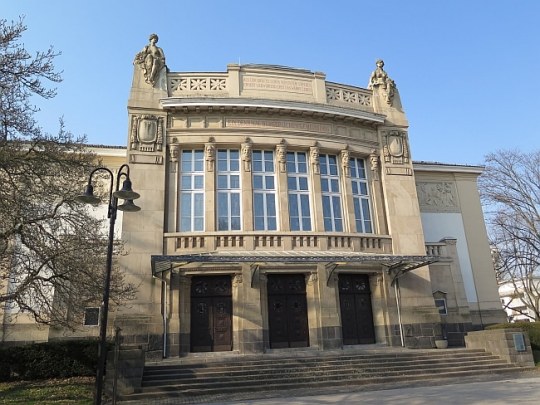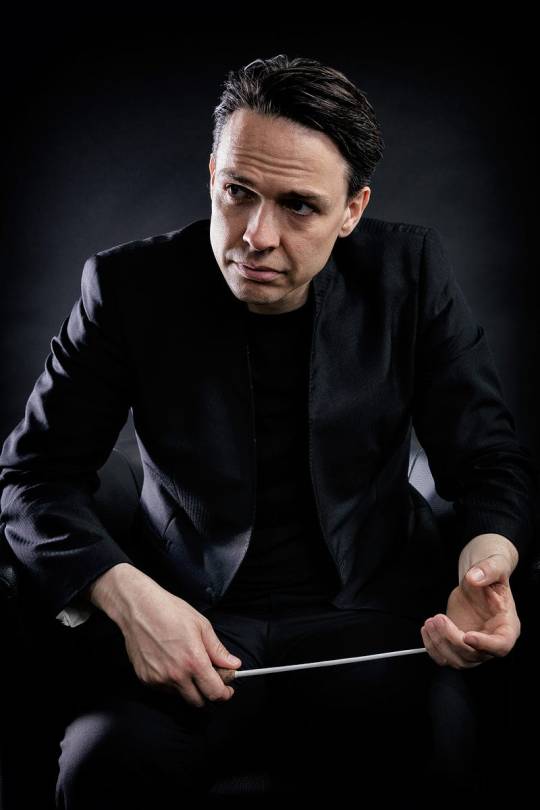#hr-Sinfonieorchester Frankfurt
Text
Luce lontana
Pēteris Vasks (16 aprile 1946): Concerto per violino e archi Tālā gaisma (Luce lontana; 1996-97). Marc Bouchkov, violino; hr-Sinfonieorchester Frankfurt, dir. Stanislav Kočanovskij.
youtube
View On WordPress
0 notes
Text
youtube
Giuseppe Sammartini (1695-1750): Oboenkonzert D-Dur ∙
I. Largo 00:00 ∙ II. Allegro 00:54∙ III. Andante 05:37 ∙ IV. Allegro 08:24 ∙
hr-Sinfonieorchester – Frankfurt Radio Symphony ∙ Nicolas Cock-Vassiliou, Oboe ∙ Fabio Biondi, Leitung ∙
4 notes
·
View notes
Text
frankfurter hr-sinfonieorchester meine geliebte
5 notes
·
View notes
Photo

Charles Dean Dixon (January 10, 1915 – November 3, 1976) was a conductor. He studied conducting at the Juilliard School and Columbia. When early pursuits of conducting engagements were stifled because of racial bias, he formed his orchestra and choral society. He guest-conducted the NBC Symphony Orchestra and the New York Philharmonic during its summer season. He guest-conducted the Philadelphia Orchestra and Boston Symphony Orchestra. He won the Ditson Conductor's Award. He left the US for the Israel Philharmonic Orchestra. He was the principal conductor of the Gothenburg Symphony in Sweden, the Sydney Symphony Orchestra in Australia, and the hr-Sinfonieorchester in Frankfurt. During his time in Europe, he guest-conducted with the WDR Sinfonieorchester in Cologne and the Symphonieorchester des Bayerischen Rundfunks in Munich. He made several recordings with the Prague Symphony Orchestra for Bärenreiter, including works of Beethoven, Brahms, Haydn, Mendelssohn, Mozart, Schumann, Wagner, and Weber. For Westminster Records, his recordings included symphonies and incidental music for Rosamunde by Schubert, symphonic poems of Liszt, and symphonies of Schumann. He recorded several American works for the American Recording Society in Vienna. Some of his WDR broadcast recordings were issued on Bertelsmann and other labels. He introduced the works of many American composers, such as William Grant Still, to European audiences. During the 1968 Olympic Games, he conducted the Mexican National Symphony Orchestra. He returned to the US for guest-conducting engagements with the New York Philharmonic, Chicago Symphony Orchestra, Detroit Symphony, Milwaukee Symphony, Pittsburgh Symphony, St. Louis Symphony, and San Francisco Symphony. He served as the conductor of the Brooklyn Philharmonic, where he gained fame for his children's concerts. He conducted most of the major symphony orchestras in Africa, Israel, and South America. His last appearance in the US was conducting the Philadelphia Orchestra in April 1975. #africanhistory365 #africanexcellence https://www.instagram.com/p/CnO8yZGrMgs/?igshid=NGJjMDIxMWI=
1 note
·
View note
Video
youtube
‘Bacewicz: Ouvertüre' performed by hr-Sinfonieorchester, Marta Gardolińska
Auftakt ∙
hr-Sendesaal Frankfurt, 15. März 2024 ∙
via hr-Sinfonieorchester – Frankfurt Radio Symphony
0 notes
Text
[Podcast] Konzert: Einmal einen besonderen Abend erleben – mit besonderen Komponisten und dem HR-Sinfonieorchester Frankfurt

In dieser Episode geht es um eine Konzertkritik eines besonderen Abends mit dem hr-Sinfonieorchester Frankfurt. Der Hauptredner erwähnt, dass er aufgrund eines technischen Problems die Einführung verpasst hat und unvorbereitet in das Konzert ging. Trotzdem war er froh, dabei zu sein. Er beschreibt die Aufführung als eine Reise durch verschiedene Landschaften, mit delikaten Glocken und kraftvollen Pauken, die verschiedene Emotionen und Wetterzustände widerspiegelten. Besonders berührt hat ihn das Zusammenspiel von Trompete und Flöte.
Die Komponistin Andrea Tarrodi und der Pianist Mao Fujita hinterließen einen starken Eindruck. Andrea Tarrodi's Komposition "Liguria" berührte den Sprecher so sehr, dass er sich vornimmt, mehr von ihr zu hören. Mao Fujita beeindruckte mit seinem Klavierspiel in Mozarts Klavierkonzert No. 23 in A-Dur. Obwohl Fujita anfangs schüchtern wirkte, eroberte er das Publikum mit seiner Musik. Seine Performance erhielt großen Applaus, und sein Zugabestück begeisterte ebenso.
Nach der Pause folgte Jean Sibelius' Symphonie No. 5 unter der Leitung von Dirigentin Dalia Staveska. Der Hauptredner lobt ihr Engagement und ihre Fähigkeit, das Orchester zu fordern. Die Symphonie beeindruckte durch ihre kraftvolle und feine Ausdruckskraft. Staveska verkörperte intensiv das Gefühl der Musik und setzte sich eindrucksvoll für ihre Interpretation ein.
Der Hauptredner ist uneins darüber, was ihn an diesem Abend am meisten beeindruckt hat. Ob die junge Komponistin, der Pianist oder die Dirigentin, alles trug zum außergewöhnlichen Erlebnis bei. Am Ende betont der Sprecher die Schönheit des Abends und die Vielfalt der musikalischen Darbietungen, die ihm nachhaltig in Erinnerung bleiben.
Lesen Sie den ganzen Artikel
0 notes
Text
Evan Christ: Opern- und Konzertengagements in Deutschland und International

Evan Christ hatte zahlreiche Konzert- und Opernengagements in Deutschland, u.a. mit dem Deutschen Symphonie-Orchester Berlin, der NDR Radiophilharmonie Hannover, dem hr-Sinfonieorchester Frankfurt, der SWR Radio-Sinfonie Stuttgart, dem MDR Sinfonie-Orchester Leipzig, den Bremer Philharmonikern, dem WDR-Funkhausorchester, der Deutschen Oper Berlin, der Komischen Oper Berlin, dem Staatstheater Hannover und dem Nationaltheater Mannheim. Auf internationaler Ebene arbeitete er mit den Zagreber Philharmonikern, dem Israel Symphony Orchestra Rishon LeZion, dem Radio Symphony Orchestra Ljubljana, dem Theater und Sinfonieorchester St. Gallen und dem Orchestre Philharmonique de Luxembourg. Im Sommer 2011 debütierte er bei den Salzburger Festspielen und führte Salvatore Sciarrino‘s Oper Macbeth mit dem Klangforum Wien auf. Er ist seit 2018 ständiger Gastdirigent beim Orquestra Clássica da Madeira, Portugal, und beim Immling Opernfestival in Bayern.
0 notes
Text
Francisco de Zurbarán (Spanish, 1598–1664) and Josef Anton Bruckner (Austrian, 1824–96) and Mayo Clinic Consumer Health: Can music help someone with Alzheimer’s disease?, Francisco de Zurbarán (Spanish, 1598–1664), Still Life with Lemons, Oranges and a Rose, 1633, Norton Simon Museum, Pasadena., Christ and the Virgin in the House at Nazareth, c. 1631–1640, Cleveland Museum of Art., Museo de Bellas Artes de Sevilla Virgen del Rosario, Hacia 1650, and Josef Anton Bruckner (Austrian, 1824–96), Berliner Philharmoniker Bruckner’s “Romantic” 4th Symphony, 2021 performance with Jakub Hrůša, hr-Sinfonieorchester – Frankfurt Radio Symphony Bruckner: 4. Sinfonie (Fassung 1878/80) ∙ hr-Sinfonieorchester ∙ Eliahu Inbal, Bruckner: 7. Sinfonie ∙ hr-Sinfonieorchester ∙ Christoph Eschenbach, Mayo Clinic Consumer Health: Can music help someone with Alzheimer’s disease? By Laurel Kelly
Francisco de Zurbarán (Spanish, 1598–1664) and Josef Anton Bruckner (Austrian, 1824–96) and Mayo Clinic Consumer Health: Can music help someone with Alzheimer’s disease?, Francisco de Zurbarán (Spanish, 1598–1664), Still Life with Lemons, Oranges and a Rose, 1633, Norton Simon Museum, Pasadena., Christ and the Virgin in the House at Nazareth, c. 1631–1640, Cleveland Museum of Art., Museo de Bellas Artes de Sevilla Virgen del Rosario, Hacia 1650, and Josef Anton Bruckner (Austrian, 1824–96), Berliner Philharmoniker Bruckner’s “Romantic” 4th Symphony, 2021 performance with Jakub Hrůša, hr-Sinfonieorchester – Frankfurt Radio Symphony Bruckner: 4. Sinfonie (Fassung 1878/80) ∙ hr-Sinfonieorchester ∙ Eliahu Inbal, Bruckner: 7. Sinfonie ∙ hr-Sinfonieorchester ∙ Christoph Eschenbach, Mayo Clinic Consumer Health: Can music help someone with Alzheimer’s disease? By Laurel Kelly
https://blog.naver.com/artnouveau19/222924196383
https://en.wikipedia.org/wiki/Francisco_de_Zurbarán
https://en.wikipedia.org/wiki/Still_Life_with_Lemons,_Oranges_and_a_Rose
https://en.wikipedia.org/wiki/The_House_in_Nazareth
https://www.facebook.com/photo/?fbid=177183324895720&set=a.167502525863800
https://www.facebook.com/BerlinPhil/videos/2925424737752504
https://youtu.be/DEssCDEAyig
https://youtu.be/uaV3eEJB55c
https://newsnetwork.mayoclinic.org/discussion/consumer-health-can-music-help-someone-with-alzheimers-disease/?sf172569375=1&fbclid=IwAR2pmDI0UJG7U3xwwlnXaP-_r2avr-5H4BtRPWT1IpOypCBowesgKliP-Mk
Francisco de Zurbarán (Spanish, 1598–1664)
Francisco de Zurbarán (/ˌzʊərbəˈrɑːn/ ZOOR-bə-RAHN, Spanish: [fɾanˈθisko ðe θuɾβaˈɾan]; baptized 7 November 1598 – 27 August 1664[3]) was a Spanish painter. He is known primarily for his religious paintings depicting monks, nuns, and martyrs, and for his still-lifes. Zurbarán gained the nickname "Spanish Caravaggio", owing to the forceful use of chiaroscuro in which he excelled.
He was the father of the painter Juan de Zurbarán.
https://en.wikipedia.org/wiki/Francisco_de_Zurbarán
Francisco de Zurbarán (Spanish, 1598–1664), Still Life with Lemons, Oranges and a Rose, 1633, Oil on canvas, 62.2 cm × 107 cm (23.6 in × 42.1 in), Norton Simon Museum, Pasadena.
https://en.wikipedia.org/wiki/Still_Life_with_Lemons,_Oranges_and_a_Rose
Francisco de Zurbarán (Spanish, 1598–1664), Christ and the Virgin in the House at Nazareth, c. 1631–1640, 165 cm (65 in) × 218.2 cm (85.9 in), Cleveland Museum of Art.
https://en.wikipedia.org/wiki/The_House_in_Nazareth
Visión de San Pedro Nolasco, 1629, Museo del Prado
https://en.wikipedia.org/wiki/Francisco_de_Zurbarán#/media/File:Visión_de_San_Pedro_Nolasco.jpg
Immaculate Conception, 1630, Museo del Prado
https://en.wikipedia.org/wiki/Francisco_de_Zurbarán#/media/File:Inmaculada_(Zurbarán).jpg
Museo de Bellas Artes de Sevilla
Tal día como hoy, 7 de noviembre, era bautizado, en 1598, en la iglesia de Nuestra Señora de la Granada en Fuente de Cantos, Francisco de Zurbarán.
Virgen del Rosario, por Zurbarán. Hacia 1650.
https://www.facebook.com/photo/?fbid=177183324895720&set=a.167502525863800
Anton Bruckner (Austrian, 1824–96), Berliner Philharmoniker Bruckner’s “Romantic” 4th Symphony, 2021 performance with Jakub Hrůša, Bruckner: 4. Sinfonie (Fassung 1878/80) ∙ hr-Sinfonieorchester ∙ Eliahu Inbal, Bruckner: 7. Sinfonie ∙ hr-Sinfonieorchester ∙ Christoph Eschenbach
Anton Bruckner (Austrian, 1824–96)
Berliner Philharmoniker
Feelings of longing for nature and transcendence » https://www.digitalconcerthall.com/en/concert/53773?utm_medium=social in Bruckner’s “Romantic” 4th Symphony, heard here in a 2021 performance with Jakub Hrůša.
https://www.facebook.com/BerlinPhil/videos/2925424737752504
https://twitter.com/BerlinPhil/status/1589698507526529024
Bruckner: 4. Sinfonie (Fassung 1878/80) ∙ hr-Sinfonieorchester ∙ Eliahu Inbal
https://youtu.be/DEssCDEAyig
hr-Sinfonieorchester – Frankfurt Radio Symphony
356K subscribers
345,550 views Dec 8, 2016
Anton Bruckner:
4. Sinfonie (Fassung 1878/80) ∙
»Romantische«
(Auftritt) 00:00 ∙
I. Bewegt, nicht zu schnell 00:43 ∙
II. Andante quasi Allegretto 18:40 ∙
III. Scherzo. Bewegt – Trio. Nicht zu schnell. Keinesfalls schleppend. – Scherzo 33:56 ∙
IV. Finale. Bewegt, doch nicht zu schnell 45:10 ∙
hr-Sinfonieorchester – Frankfurt Radio Symphony ∙
Eliahu Inbal, Dirigent ∙
Alte Oper Frankfurt, 25. November 2016 ∙
Bruckner: 7. Sinfonie ∙ hr-Sinfonieorchester ∙ Christoph Eschenbach
https://youtu.be/uaV3eEJB55c
hr-Sinfonieorchester – Frankfurt Radio Symphony
356K subscribers
512,658 views Oct 9, 2018
Anton Bruckner:
7. Sinfonie E-Dur ∙
(Auftritt) 00:00 ∙
I. Allegro moderato 00:30 ∙
II. Adagio. Sehr feierlich und sehr langsam 21:23 ∙
III. Scherzo. Sehr schnell 43:10 ∙
IV. Finale. Bewegt, doch nicht schnell 53:33 ∙
hr-Sinfonieorchester – Frankfurt Radio Symphony ∙
Christoph Eschenbach, Dirigent ∙
hr-Sinfoniekonzert ∙
Alte Oper Frankfurt, 27. September 2018 ∙
Josef Anton Bruckner (Austrian, 1824–96)
Josef Anton Bruckner (German: [ˈantoːn ˈbʁʊknɐ] (listen); 4 September 1824 – 11 October 1896) was an Austrian composer, organist, and music theorist best known for his symphonies, masses, Te Deum and motets. The first are considered emblematic of the final stage of Austro-German Romanticism because of their rich harmonic language, strongly polyphonic character, and considerable length.[1] Bruckner's compositions helped to define contemporary musical radicalism, owing to their dissonances, unprepared modulations, and roving harmonies.
Unlike other musical radicals such as Richard Wagner and Hugo Wolf, Bruckner showed extreme humility before other musicians, Wagner in particular. This apparent dichotomy between Bruckner the man and Bruckner the composer hampers efforts to describe his life in a way that gives a straightforward context for his music. Hans von Bülow described him as "half genius, half simpleton".[2] Bruckner was critical of his own work and often reworked his compositions. There are several versions of many of his works.
His works, the symphonies in particular, had detractors, most notably the influential Austrian critic Eduard Hanslick and other supporters of Johannes Brahms, who pointed to their large size and use of repetition,[3] as well as to Bruckner's propensity for revising many of his works, often with the assistance of colleagues, and his apparent indecision about which versions he preferred. On the other hand, Bruckner was greatly admired by subsequent composers, including his friend Gustav Mahler.
https://en.wikipedia.org/wiki/Anton_Bruckner
Mayo Clinic Consumer Health: Can music help someone with Alzheimer’s disease? By Laurel Kelly
Mayo Clinic
@MayoClinic
·
Nov 8
Consumer Health: Can music help someone with #AlzheimersDisease? https://mayocl.in/3UwQ0xW
@MayoClinicNeuro
https://twitter.com/MayoClinic/status/1589720759903010816
Mayo Clinic
Consumer Health: Can music help someone with Alzheimer’s disease? https://mayocl.in/3FWjgdw
By Laurel Kelly
Consumer Health: Can music help someone with Alzheimer’s disease?
November 7, 2022
Alzheimer's disease is a progressive disorder that causes brain cells to waste away and die. Alzheimer's disease is the most common cause of dementia, which is a term used to describe a group of symptoms that affect memory, thinking and social abilities severely enough to interfere with daily function.
As many as 5.8 million people in the U.S. were living with Alzheimer’s disease in 2020, according to the Centers for Disease Control and Prevention. And this number is projected to nearly triple to 14 million people by 2060.
Memory loss is the key symptom of Alzheimer's disease. An early sign of the disease is difficulty remembering recent events or conversations. As the disease progresses, memory impairment persists and worsens, affecting the ability to function at work or at home.
Musical memories often are preserved in Alzheimer's disease, though, because key brain areas linked to musical memory are relatively undamaged by the disease. Research suggests that listening to or singing songs can provide emotional and behavioral benefits for people with Alzheimer's disease and other types of dementia.
Music also can benefit caregivers by reducing anxiety and distress, lightening the mood, and providing a way to connect with loved ones who have Alzheimer's disease — especially those who have difficulty communicating.
If you'd like to use music to help a loved one who has Alzheimer's disease, consider these tips:
Think about your loved one's preferences.
What kind of music does your loved one enjoy? What music evokes memories of happy times in his or her life? Involve family and friends by asking them to suggest songs or make playlists.
Set the mood.
To calm your loved one during mealtime or a morning hygiene routine, play music or sing a song that's soothing. When you'd like to boost your loved one's mood, use more upbeat or faster-paced music.
Avoid overstimulation.
When playing music, eliminate competing noises. Turn off the TV. Shut the door. Set the volume based on your loved one's hearing ability. Choose music that isn't interrupted by commercials, which can cause confusion.
Encourage movement.
Help your loved one to clap along or tap his or her feet to the beat. If possible, consider dancing with your loved one.
Sing along.
Singing along to music together with your loved one can boost the mood and enhance your relationship. Some early studies also suggest musical memory functions differently than other types of memory, and singing can help stimulate unique memories.
Pay attention to your loved one's response.
If your loved one seems to enjoy particular songs, play them often. If your loved one reacts negatively to a particular song or type of music, choose something else.
Connect with other caregivers talking about Alzheimer's disease in the Caregivers: Dementia support group on Mayo Clinic Connect, an online patient community moderated by Mayo Clinic.
https://newsnetwork.mayoclinic.org/discussion/consumer-health-can-music-help-someone-with-alzheimers-disease/?sf172569375=1&fbclid=IwAR2pmDI0UJG7U3xwwlnXaP-_r2avr-5H4BtRPWT1IpOypCBowesgKliP-Mk
0 notes
Text
1 note
·
View note
Link
#DieKrönungderKammermusik#Harfen-Fantasien#Jussenpur#RhapsodyinBlue#Tastenstürme#WarburgerMeisterkonzerte
0 notes
Text
Finché vivi, splendi
Epitaffio di Sicilo. Esegue l’Atrium Musicae de Madrid diretto da Gregório Paniagua.
Molto suggestivo: una delle più antiche composizioni musicali che ci siano pervenute complete, databile fra il II secolo a.C. e il I d.C. È incisa su una stele funeraria rinvenuta nel 1883 a Aydın, presso Tralles, dall’archeologo britannico sir William Mitchell Ramsay. Egli pubblicò il testo, ma non si accorse…
youtube
View On WordPress
0 notes
Text
youtube
Friedrich Cerha: Schlagzeugkonzert ∙
I. 00:55 – II. 09:20 – III. 23:04 ∙
Martin Grubinger, Schlagzeug
hr-Sinfonieorchester – Frankfurt Radio Symphony ∙ ∙ Andrés Orozco-Estrada, Dirigent ∙
5 notes
·
View notes
Text
youtube
Antonín Dvořák: Symphony in E minor, "From the New World", Op. 95, B 178
(Symfonie č. 9 e moll "Z nového světa)
Performed by Frankfurt Radio Symphony (hr-Sinfonieorchester) & Andrés Orozco-Estrada
#antonín dvořák#classical music#frankfurt radio symphony#hr-Sinfonieorchester#classical music faves#sometimes i just listen to this nonstop#especially the first movement#Youtube
2 notes
·
View notes
Video
youtube
‘Gershwin: An American in Paris (Originalfassung)’ performed by hr-Sinfonieorchester, Giedrė Šlekytė
hr-Sendesaal Frankfurt, 6. Oktober 2023
23 minutes. via hr-Sinfonieorchester
0 notes